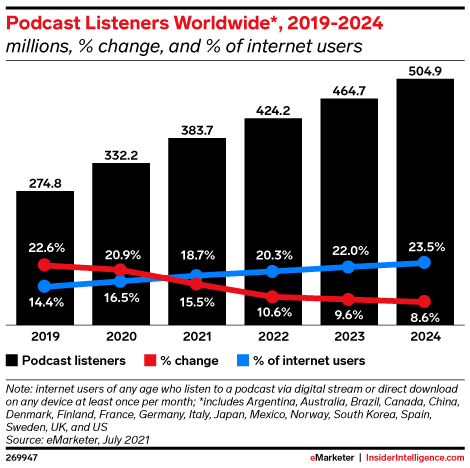 According to Insider Intelligence, the number of people in the United States listening to podcasts is expected to increase by 10% this year. Additionally, their research estimates that more than 60% of U.S. citizens 18 to 34 will listen to at least one podcast monthly in 2022. With statistics like that, it’s easy to understand why so many businesses have started launching podcasts of their own.
According to Insider Intelligence, the number of people in the United States listening to podcasts is expected to increase by 10% this year. Additionally, their research estimates that more than 60% of U.S. citizens 18 to 34 will listen to at least one podcast monthly in 2022. With statistics like that, it’s easy to understand why so many businesses have started launching podcasts of their own.
However, before you launch a podcast for your brand or business, there are several things you need to consider. In doing so, you will either give yourself a solid foundation from which to grow, or something to place in the ages-old “it sounded like a good idea at the time” file.
Here are four things to consider when launching a podcast:
1. Why Are You Starting the Podcast?
Simply put, the first step in launching a podcast is figuring out why you want to do it in the first place.
Do you want to start a podcast to raise awareness of your company or brand? Do you want to position yourself and/or your business as a thought leader in your local market/region/industry? Do you envision the podcast as a piece of content marketing that will help to increase sales, or will it be used to show another side of your company in hopes of connecting to an audience you might otherwise miss?
Carefully considering the answers to these questions will help bring your podcast into focus, allowing you to set goals for the production and giving a clear direction about the type of content you should produce.
2. How Much Time Are You Willing to Invest?
We all know the expression about time and money and like many other aspects of business, the amount of time you invest in your podcast will be reflected in the final product.
It’s one thing to simply press “record” and call it a podcast, but it’s another altogether to take the time needed to edit out vocal interferences (“umms”), conduct research about topics and guests, market and promote the podcast, and more. The more time you invest, the more you will be able to fine-tune your processes and determine what is and isn’t working, which will allow you to (hopefully) grow your following.
A podcast can be a full-time job depending on the amount of energy you give it. If you’re planning on taking the Field of Dreams approach (“if you build it, they will come”), you may soon discover that your time is likely better spent elsewhere.

3. What Resources Can You Dedicate to Your Podcast?
At their most basic level, podcasts are audio recordings of people talking. At their best, they are engaging conversations featuring high-quality audio and/or video, music, live audiences reacting in real-time, and insightful/entertaining content. The main difference between the two is the number of resources allocated to the production of the podcast.
Looking to keep things quick and easy? You can record yourself and a friend talking into a smartphone and upload it to YouTube or Facebook for free and call it your podcast. Want to be a little more professional? That’s when you’ll want to start researching everything from the pros and cons — and costs — of different podcast equipment such as microphones, headphones, mixers, and recording software.
Planning on making your podcast a full facet of your operations? If the answer is “yes,” you’ll want to start looking into the possibility of buying ads on social media, optimizing your episode descriptions and hashtags for Google rankings, and finding ways to get your audience to reshare your content. These are critical considerations that need to be addressed as the more resources you allocate, the more time and money you should expect to spend doing so.
4. What Is Your Endgame?
While it’s important to know why you want to start a podcast, you also need to be able to re-assess later to see if the production of your podcast is meeting the goals you established early on.
Are you gaining new followers but not seeing an increase in sales? Maybe it’s time to revamp your content. Are you seeing an increase in sales but find yourself spending too much time putting each episode together? Hiring another person to help handle the podcasting process could help alleviate some of the stress — if you think it’s worth it (or maybe you just need to take a break).
Constantly evaluating the effectiveness of what you’re doing will not only help to keep you focused, but also ensure your podcast stays fresh for listeners, sponsors, and (perhaps most importantly) yourself.
Overall, while launching a podcast is no easy task, the rewards your business can reap by doing so make it an endeavor at least worth considering. If you do find yourself venturing into the ever-increasingly popularity of the podcasting world, then in the words of a broadcasting legend who would likely be podcasting if he were alive today: “good night and good luck.”
Want more creative content marketing tips? Start with our guide on “Effective Blogging for Small Businesses,” then discover “4 ‘Scrappy Marketing’ Strategies for Promoting Your Business on a Budget.”


